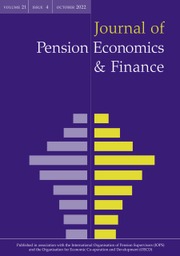Article contents
Discretion in the accounting for defined benefit obligations – an empirical analysis of German IFRS statements
Published online by Cambridge University Press: 22 July 2014
Abstract
Following the research approach of Hann et al. (2007), this study investigates how discretion in the determination of the defined benefit obligation (DBO) is perceived by investors using a sample of listed German companies in the period of 2005–2011. For this, actuarial assumptions – discount interest rates, compensation growth rate and projected future pension increases – are replaced by their respective industry medians to obtain that component of the DBO, which can be attributed to discretion. We find that the discretionary component is not value relevant in overall terms, which is in contrast to prior research. We provide an explanation in the country-specific characteristics of Germany. Furthermore, we find weak evidence that the discretionary component is incorporated in investor's equity valuations when pension plans are distinctly underfunded.
Keywords
- Type
- Articles
- Information
- Copyright
- Copyright © Cambridge University Press 2014
References
- 4
- Cited by


